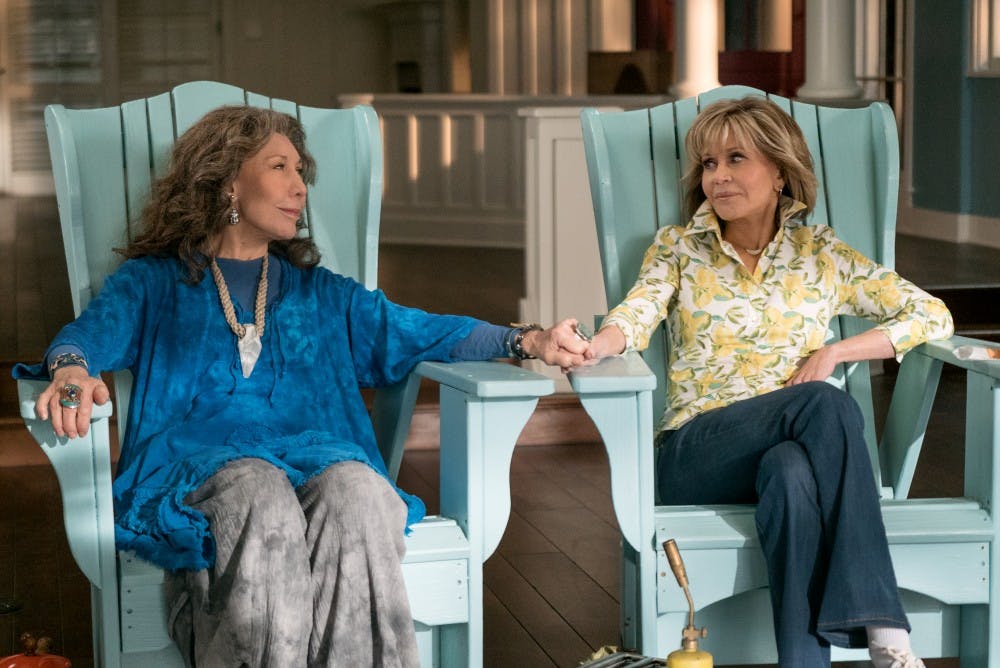To write about Netflix’s comedy television series, Grace and Frankie, through the lens of love appears counterintuitive. The show opens to the end of two marriages and the unlikely (and unwanted) partnership of the titular characters. It is clearly a recipe for a disaster—Grace (Jane Fonda) is a snobby, proper businesswoman and Frankie (Lily Tomlin) an eccentric, hippie artist. Their husbands, Robert and Sol (Martin Sheen and Sam Waterson), inform them over dinner that they’re gay and want get married to each other—the catalyst for the events of the sitcom. Grace and Frankie, forced to live together, are mismatched and miserable.
Why, then, would there be anything about love? The truth is that love (specifically, platonic love) is the basis of the show. The first season is focused on the characters warming up to each other and by the third season they are undoubtedly the most important people in each other's lives. However, it is not just these two that paint the world of Grace and Frankie with unwavering affection—it is their family, their friends, and, most surprisingly, their ex–husbands.
On paper, the premise certainly doesn’t look promising. The whole show seems apt for battle after battle. Grace and Frankie would be painted as bitter rivals, their husbands as horrible backstabbers, and their children torn between their parents. This narrative prevails for maybe the first episode, but it dies out quickly when we—and the characters—realize that it is love that holds them together.
Romantic love is never placed above familial or platonic affection, but it is also never trivialized. Sol and Robert are humanized throughout their divorces with their wives and their eventual marriage to each other because they feel as though they have been living a lie. Neither “side” of the divorce is seen as inherently villainous for this. To that point, the relationship between Sol and Robert is artfully crafted, a sweet connection which has been brewing for decades between them. Besides Sol and Robert, Grace and Frankie —two women in their sixties!—are allowed to explore romantic relationships as well. This is surprising–especially on a mainstream television show–and it is never done for just comedic effect. They find people who make them happy but they are not desperate for anyone.

The love of the family radiates from every episode. There are the main characters and their ex–husbands, but also their children: Grace and Robert’s Brianna (June Diane Raphael) and Mallory (Brooklyn Decker) and Frankie and Sol’s Coyote (Ethan Embry) and Bud (Baron Vaughn). They are all self–sufficient adults, but so much of Grace and Frankie is about their children coming together to care for their parents. Even the newly–divorced couples are able to come together for the sake of the family. Grace, Robert, Frankie, and Sol do not become bitter exes, instead they become even closer.
Most importantly, however, is platonic love, and with that, we have the show’s title. Grace and Frankie begin as two entirely mismatched figures who have hated each other since they first met. They are too different, too divided, too raised in opposing ways to get along. Grace is prim, organized, polite; Frankie is relaxed, artistic, free–spirited. When they clash, they also grow closer, and it becomes clear by the end of the first season that they are important to each other. The strength of their connection is proved throughout the series through sacrifices on each character’s part. They learn from each other: Frankie realizes how she appears to people and Grace learns to relax and be herself. They are both different people because of the other, and each change is clearly for the better.
Grace and Frankie is at its best when the mish–mashed families are together. It is human connection and interaction that keeps the show so alive and so human. To see something presented so purely and so carefully, each character seeming like an individual, is surprising. The ability of old women to be friends, to like each other, to rely on each other, is a rarely depicted fact of life; not only is it important to the show, but it is the basis of it. Grace and Frankie is a piece of media that does not shy away from love and forgiveness, especially between its main characters. For this, it is revolutionary.







